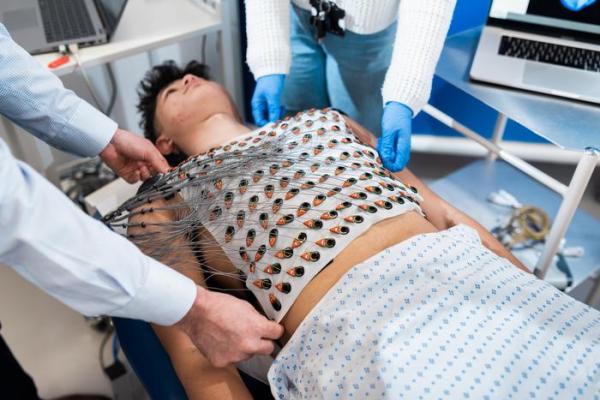
ECGI vest developed at UCL being worn by a UCL medical student. Image courtesy of UCL Institute of Cardiovascular Science / James Tye
December 19, 2023 — A vest that can map the electrical activity of the heart in fine detail could potentially be used to better identify people at high risk of sudden cardiac death, suggests a new study led by UCL researchers.
Electrical signals trigger our hearts to contract, regulating our heartbeat. Problems with these signals result in heart rhythm disorders, experienced by two million people in the UK, and can cause sudden death.
Until now, detailed mapping of the heart’s electrical activity was rare – requiring either a catheter to be inserted inside the heart cavity or carried out using single-use devices that were costly and time consuming to set up, and involve radiation.
But an electrocardiographic imaging (ECGI) vest developed by UCL researchers, described in a new paper in the Journal of Cardiovascular Magnetic Resonance, holds potential to be used in standard care as it is re-usable and time-efficient, with only five minutes needed per patient.
Electrical data from the vest’s 256 sensors can be combined with detailed images of heart structures taken by MRI (magnetic resonance imaging) to generate 3D digital models of the heart and the waves of electrical activity flowing through it.
Dr Gaby Captur (UCL Institute of Cardiovascular Science and the Royal Free Hospital, London), who developed the vest with funding from the British Heart Foundation (BHF) and the Society for Cardiovascular Magnetic Resonance, said: “We identified a problem in cardiology. Heart imaging has made remarkable progress in recent decades, but the electrics of the heart have eluded us. The standard technology to monitor the heart’s electrical activity, the 12-lead electrocardiogram (ECG), has barely changed in 50 years.
“We believe the vest we have developed could be a quick and cost-effective screening tool and that the rich electrical information it provides could help us better identify people’s risk of life-threatening heart rhythms in the future.
“In addition, it can be used to assess the impact of drugs, new cardiac devices, and lifestyle interventions on heart health.
“Currently, predicting risk of sudden cardiac death is difficult, as it is not known, for instance, how risk might be affected by a particular structural feature or abnormality of the heart.”
Dr Matthew Webber (UCL Institute of Cardiovascular Science), vest co-developer, said: “Cardiac MRI, the gold standard in heart imaging, shows us the health of the heart muscle tissue, including where dead muscle cells might be. In-depth electrocardiographic imaging can help us correlate these features with their consequences – the impact they may be having on the heart’s electrical system. It adds a missing part of the puzzle.”
Better stratification of risk, the researchers say, would help clinicians to identify people in need of an implantable cardioverter defibrillator (ICD) – a device that monitors heart rhythm and shocks the heart back into a normal rhythm if needed. These devices can be life-saving but also carry a risk of infection and can cause distress if they give shocks that are not needed.
Potential biomarkers obtained via ECGI that could be used to predict risk will need to be confirmed (or dismissed) via longitudinal studies that follow people over time to see if the biomarkers are associated with higher risk outcomes.
The ECGI vest is re-usable because it uses dry electrodes, which can be washed in between uses, rather than metallic electrodes that require a layer of gel between the electrode and the skin. This is the first time such electrodes have been used for ECGI.
The paper in the Journal of Cardiovascular Magnetic Resonance assessed the vest’s feasibility in 77 patients and found it to be reliable and durable. The vest has since been used successfully in 800 patients. Prior to 2020, studies mapping the electrical activity of the heart had 20 or 30 patients at most.
The vest is currently being used to map the hearts of people with diseases such as hypertrophic cardiomyopathy and dilated cardiomyopathy.
With help from UCL Business, Dr Captur has patented the ECGI vest in the U.S. and is working with g.tec medical engineering GmbH, which made the prototype vest, to explore how it could be manufactured more widely.
For more information: https://jcmr-online.biomedcentral.com/


 February 03, 2026
February 03, 2026 









